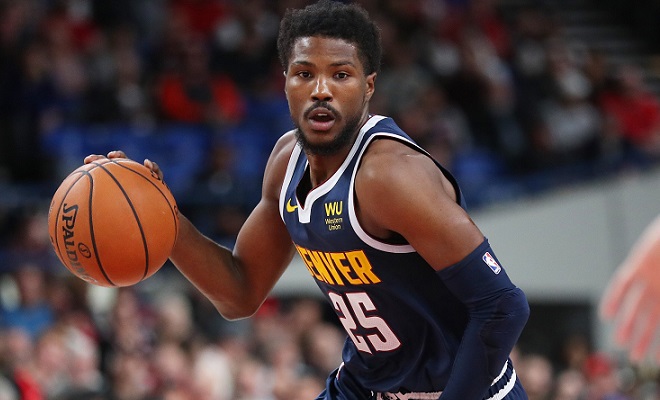-
 February 5, 2020, 2:42 am
February 5, 2020, 2:42 amLast Updated on February 5, 2020 2:58 am by Aaron Bruski | Published: February 5, 2020
The Wolves’ pursuit of D’Angelo Russell has reportedly led them to a wide chasm between themselves and the Warriors. Rather than wait around for a deal that may never come for the player that they so desperately want, Minnesota struck the first big trade of deadline season.
Out went Robert Covington and Jordan Bell to Houston and Shabazz Napier, Noah Vonleh and Keita Bates-Diop on to Denver. In came Malik Beasley, Juancho Hernangomez, Jarred Vanderbilt and Evan Turner.
The Wolves also received a lottery-protected first-round pick from Atlanta by way of Brooklyn in the deal.
There’s a lot to unpack in this transaction, with the 12-player deal being the largest since the year 2000, but it must start with Minnesota’s decision to unload Covington.
This season, under the leadership of Gersson Rosas, was supposed to be about the Wolves finding who fits and who doesn’t around Karl-Anthony Towns. In that vein, it’s a surprise that an elite 3-and-D presence like Covington was the first to go, given his skillset, malleability and reasonable contract – in the second year of a four-year, $46.9 million deal.
That sounds like a player who can fit almost any roster machination, and the sort of support player that would help Minnesota get back to competitive basketball faster than otherwise. Even at 29 and with a knee surgery under his belt, teams are paying premiums for skillsets like Covington’s.
And yet, it was painfully obvious that change was needed for the Wolves. Since a 10-8 start they are a dreadful 5-26, and though Covington is not at fault for this horrid stretch of basketball, he’s also one of the only players on the roster that had definitively positive trade value. The aspects that made him so appealing to the Wolves are the same things that allowed them to pick up a first-round pick and a few intriguing young players.
This is less about Minnesota having a desire to trade Covington and more the team realizing that moving him could be one of the few actual bullets in the chamber as Rosas and company start to remake the roster.
Beasley should be considered the headliner of the return. The 23-year-old thrived with Denver last season, rising to the occasion and performing admirably in the wake of injuries to Will Barton and Gary Harris. Beasley averaged 11.3 points, 2.5 rebounds, 1.2 assists, 0.7 steals and 2.0 3-pointers in 23.2 minutes per contest across 81 games last season, including 18 starts. He shot .474 from the field and a blistering .402 from behind the arc.
This campaign has been less kind to Beasley, who has even fallen out of the rotation at times as Harris and Barton have stayed mostly healthy, with Barton in particular looking fantastic after core muscle surgery derailed his season last year. Beasley is averaging 18.1 minutes per game and is shooting just .392 from the floor, though he’s still a respectable .364 from behind the arc.
An impending restricted free agent, Beasley should have the chance to compete for more minutes on the wing in Minnesota, where Tuesday’s trade leaves just Jarrett Culver, Josh Okogie and Andrew Wiggins standing – though Wiggins may play full-time small forward and Culver may be forced into point guard duty given the departure of Shabazz Napier.
The trade of Napier leaves Minnesota with only two-way player Jordan McLaughlin on the point guard depth chart, which means that they’ll either force one of their young wings to become more of a playmaker or make another move to shore up the position.
As for a more direct replacement for Covington, Hernangomez could be stepping into a sizable role. Basketball-reference credits Hernangomez with 28% of his minutes as a small forward and 63% of his time spent at power forward, which makes him a natural fit for Covington’s combo forward role. While he lacks the same prowess on either end of the floor, the 24-year-old may still have some upside to explore just 2,871 minutes into his four-year career.
A career .350 3-point shooter, Hernangomez has seen his efficiency swing wildly from year to year, which is perhaps a result of a lack of rhythm on a deep Denver team. Like Beasley, he is an impending restricted free agent who should get an immense opportunity to play himself into Minnesota’s long-term plans.
Minnesota also added sophomore Jarred Vanderbilt from the Nuggets, sending Keita Bates-Diop back to Denver. The trade is not structured as a separate one-for-one but these two are the most analogous parts of the deal.
Bates-Diop, a fellow second-year player, has seen more minutes this season as a result of Karl-Anthony Towns’ lengthy absence due to a knee sprain. It’s been a mixed bag, with Bates-Diop going .330 from 3-point range and posting a minus-11.3 net rating in his time on the floor. That’s not all his fault, and the shooting is a step forward from his ugly .250 mark as a rookie. Where KBD shines is as an energetic defender and rebounder, with a rebounding rate of 7.7%.
Enter Vanderbilt, who spent most of his rookie season sidelined by a foot injury. Although Bates-Diop is still a spring chicken with 1,149 minutes in 67 career games, he’s a grizzled veteran when contrasted with Vanderbilt’s 103-minute career so far. As such, Vanderbilt’s G League numbers may be more illuminating: 14.2 points, 8.5 rebounds, 1.5 assists, 1.3 steals, 0.9 blocks and 0.4 3-pointers in 25.7 minutes per game on .518 from the field last season.
Vanderbilt has been a strong rebounder dating back to college and has put up a 13.3% rebound rate in his limited action this year. Checking in at 20 years old compared to Bates-Diop’s 24, the Wolves can use the rest of the season to see whether Vanderbilt’s own brand of energetic ball can hold up in real minutes, again hoping to tap into some upside — upside that simply wouldn’t be present in the older Bates-Diop.
The Wolves also dealt away Bell and Vonleh, two low-risk additions from last summer who had largely fallen out of the rotation.
Minnesota also added Evan Turner from the Hawks, though he doesn’t figure to have much of a role for this young team. A buyout could be on the table, or the Wolves could look to flip his expiring contract (with an annual salary of $18.6 million) in a separate deal. What comes next will help paint the fuller picture, because this does not seem like the team’s final transaction of the year.
The Wolves have made it known that they’re looking for pieces to build around. While Beasley, Hernangomez and Vanderbilt are quality fliers, and may even become long-term contributors, they do not have the looks of impact players or signature acquisitions. Despite some worthwhile additions on Tuesday night, more deals could be coming in short order, especially with that extra first-round pick now in their pocket. Minnesota still has a long way to go in their reconstruction and the next steps may come within 36 hours.
